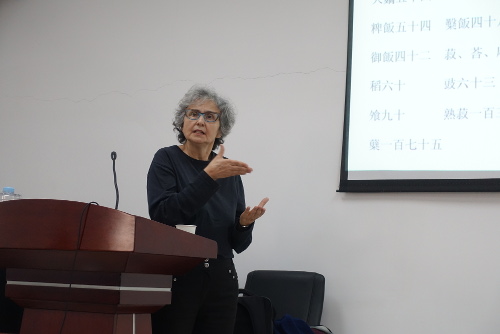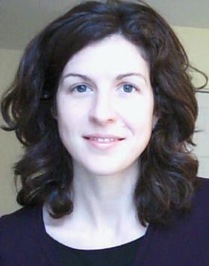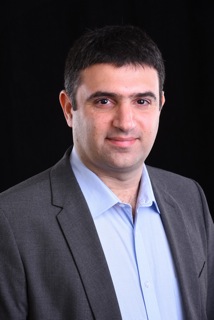
Keynote speakersKarine Chemla (CNRS, SPHERE, France) Quantities, standards, measurement and computation. Views from mathematical sources from the ancient world Quantities can be assessed using either measurement procedures, or mathematical computations, or even a mixture of the two. We are today quite accustomed to equate the expressions of quantities yielded using these various types of procedures. However, these procedures involve operations and entities of very different kinds: concrete, practical measurement procedures involving instruments and standards, on the one hand, and mathematical calculations on the other. As a result, expressions of quantities of the same type are shaped differently, and accordingly present differences.
Karine Chemla is Senior Researcher at the CNRS in SPHERE laboratory
(Univ. Paris Diderot). She focuses, from a historical anthropology viewpoint,
on the relationship between mathematics and the various cultures in the
context of which it is practiced. She edited The History of Mathematical
Proof in Ancient Traditions (Cambridge University Press, 2012); Texts,
Textual acts and the History of Science (with J. Virbel, Springer, 2015);
The Oxford Handbook of Generality in Mathematics and the Sciences
(with R. Chorlay and D. Rabouin, Oxford University Press, 2016); and
Cultures without culturalism: The making of scientific knowledge (with
Evelyn Fox Keller, Duke University Press, 2017).
Wendy S. Parker (Durham University, United Kingdom) Measuring via computer simulation? In a classic paper, Dudley Shapere (1982) argued for extending the philosophical concept of observation beyond its previous associations with perception, to allow for observation by or with scientific instruments. His discussion took as its starting point a somewhat curious claim made by astrophysicists: that they could ‘directly observe’ the center of the sun using complex instrumentation located beneath earth’s surface. Today, scientific discourse once again prompts philosophers to reflect upon the scope of observation and measurement: in various fields – including computational chemistry, climate science and others – scientists now speak of ‘observing’ or ‘measuring’ the world via computer simulation. What are we to make of this? Is it just loose talk? Does it signal a need to further extend our philosophical concepts of observation and measurement? To what extent can ‘observing’ and ‘measuring’ practices involving computer simulation be accommodated by existing philosophical concepts? This talk will explore these questions.
Wendy Parker is Associate Professor of Philosophy and Associate Director
of the Centre for Humanities Engaging Science and Society (CHESS) at Durham
University, UK. Her research addresses questions in the epistemology of
contemporary science, especially climate science, with a particular focus
on the practice of computer simulation. Her work has been published in a
variety of journals in both philosophy of science and meteorology / climate
science. She is currently Co-Editor-in-Chief (with Steven French) of The
British Journal for the Philosophy of Science.
Oliver Schlaudt (Heidelberg University, Germany) “Who is there that doesn't calculate?” The homo economicus as a measuring instrument In this talk, I will provide an overview of questions related to measurement in current economic theory and economics-based policy. I will make the claim that the infamous “homo economicus” does not simply provide a model for economic behaviour, as is usually assumed, but that he is used at many occasions as a measuring device. This is especially the case when there is no market so that prices have to be produced artificially, as for example the prices for human or natural capital in the framework of national accounting and cost benefit analyses (the same holds for non-monetary indicators that are functionally equivalent to prices, such as performance indicators in the framework of New Public Management). Oliver Schlaudt is associate professor at the philosophy department of the University of Heidelberg, Germany. His main research interests centre upon the philosophy of the natural and the social sciences, with a special focus on measurement and quantification. He organised with Alfred Nordmann the Dimensions of Measurement congress which took place at Bielefeld in 2013.
Eran Tal (McGill University, Canada) Measurement, Prediction and Coherence Measurement and prediction are traditionally viewed as two distinct kinds of activity: measurement provides answers to questions about actual states of nature, whereas prediction extracts hypothetical consequences from a theory or model. This distinction is overly simplistic, and ignores the central role prediction plays in measurement. Measurement outcomes are selected based on their ability to maximize the predictive accuracy of a model of the measurement process, as well as the predictive scope of background theories. This implies a more nuanced, coherentist picture of the relation between prediction and measurement than the traditional picture suggests.
Eran Tal is an Assistant Professor of philosophy at McGill University. Until
2016 he held a Marie Curie Fellowship at the Department of History and
Philosophy of Science at the University of Cambridge, and before that an
Alexander von Humboldt Fellowship at Bielefeld University in Germany. He
received his PhD in philosophy from the University of Toronto in 2012. His work
focuses on the concepts and problems involved in designing, operating and
interpreting measurement procedures in the natural and social sciences. He is
the author of the entry “Measurement in Science” in the Stanford Encyclopedia
of Philosophy, and of articles published in the British Journal for the
Philosophy of Science, Measurement, Philosophy of Science, Studies in History
and Philosophy of Science, and Synthese.
|




